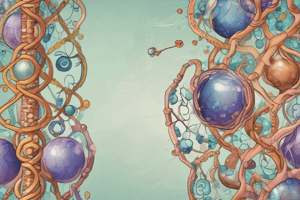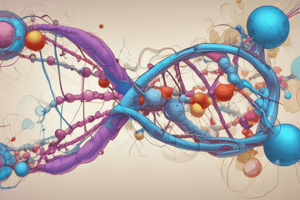Podcast
Questions and Answers
At what level of life organization is reproduction carried out on the basis of matrix synthesis?
At what level of life organization is reproduction carried out on the basis of matrix synthesis?
- cellular (correct)
- fabric
- molecular
- subcellular
Which nitrogenous bases form a complementary pair?
Which nitrogenous bases form a complementary pair?
- G + C
- G + T
- A + T
- C + T (correct)
What type of bonds hold complementary pairs of nucleotides together in DNA?
What type of bonds hold complementary pairs of nucleotides together in DNA?
- covalent
- hydrogen (correct)
- phosphodiester
- peptides
What type of bonds connect nucleotides in a nucleic acid chain?
What type of bonds connect nucleotides in a nucleic acid chain?
What is the primary function of DNA?
What is the primary function of DNA?
What is the primary function of t-RNA?
What is the primary function of t-RNA?
What is the primary function of i-RNA in eukaryotes?
What is the primary function of i-RNA in eukaryotes?
What is the primary function of r-RNA?
What is the primary function of r-RNA?
Where is DNA contained?
Where is DNA contained?
Where is r-RNA found?
Where is r-RNA found?
What structure is formed by eight molecules of histone proteins and a section of the DNA molecule?
What structure is formed by eight molecules of histone proteins and a section of the DNA molecule?
What type of chromosome has arms p and q of the same length?
What type of chromosome has arms p and q of the same length?
What type of chromosome has arms p and q that differ slightly in length?
What type of chromosome has arms p and q that differ slightly in length?
What type of chromosome has arms p and q that differ significantly in length?
What type of chromosome has arms p and q that differ significantly in length?
What type of chromosome has only one arm?
What type of chromosome has only one arm?
During which period of the mitotic cycle does DNA synthesis occur?
During which period of the mitotic cycle does DNA synthesis occur?
Flashcards are hidden until you start studying
Study Notes
Reproduction and DNA
- Reproduction is carried out at the molecular level through matrix synthesis.
Nitrogenous Bases
- Pyrimidine class nitrogenous bases include C and T.
DNA Structure
- Complementary pairs of nucleotides in the double strand of DNA are held together by hydrogen bonds.
- Nucleotides in the chain of a nucleic acid are connected by phosphodiester bonds.
DNA Functions
- DNA stores genetic information.
t-RNA Functions
- t-RNA transports amino acids to the ribosome.
i-RNA Functions in Eukaryotes
- i-RNA transfers genetic information to the ribosome.
r-RNA Functions
- r-RNA participates in the formation of the ribosome structure.
DNA Location
- DNA is contained in the nucleus, mitochondria, and chloroplasts.
r-RNA Location
- r-RNA is found in ribosomes and the nucleus.
Nucleosome Structure
- A nucleosome is formed by eight molecules of histone proteins and a section of the DNA molecule that makes approximately 1.8 turns around them.
Chromosome Classification
- A metacentric chromosome has arms p and q of the same length.
- A submetacentric chromosome has arms p and q of slightly different lengths.
- An acrocentric chromosome has arms p and q of significantly different lengths.
- A telocentric chromosome has one arm.
Centromeric Index
- The centromeric index is the ratio of the length of the short arm to the length of the entire chromosome.
Mitotic Cycle
- DNA synthesis occurs during the synthetic period of the mitotic cycle.
Studying That Suits You
Use AI to generate personalized quizzes and flashcards to suit your learning preferences.




